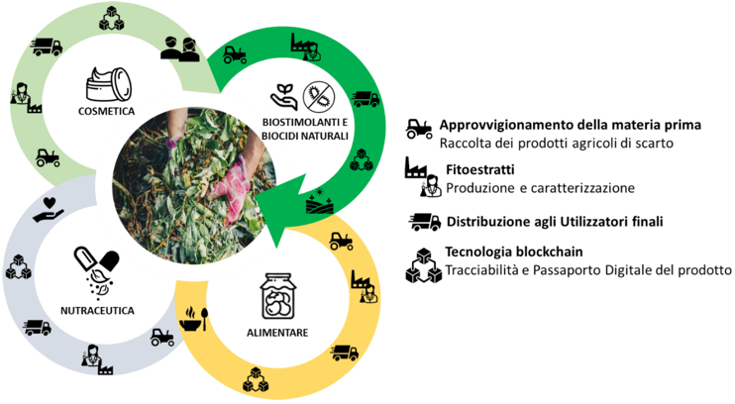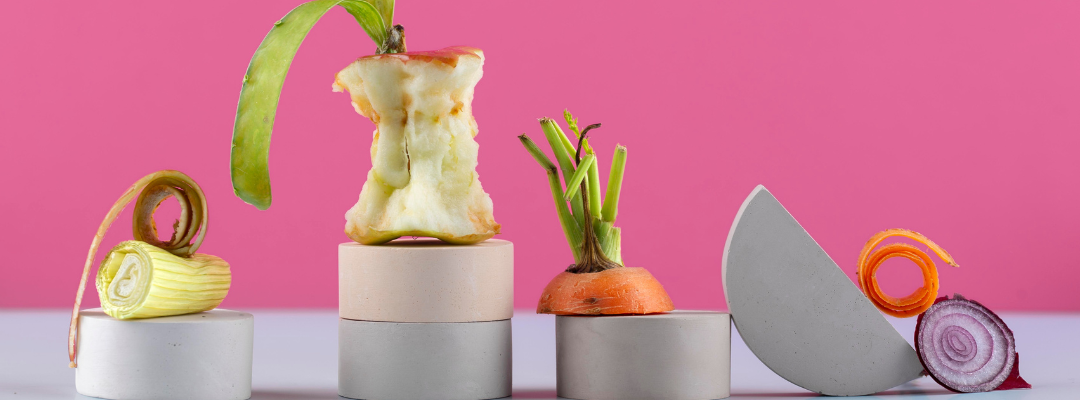From Agri-Food Waste to New High Value-Added Products:
The UMARI Project
The UMARI project – Using Agro-Food Waste Matrices for Recycling into Functional Ingredients for the Nutraceutical, Cosmetic, and Agricultural Sectors – began in March 2024, and activities are now in full swing. UMARI, funded by the NODES (North-West Digital and Sustainable) innovation ecosystem and active until May 2025, addresses the need for a transition towards sustainable agriculture based on the circular economy, using the Calabria region as a case study.
The Context
Today, one of the main challenges for maintaining the stability of our ecosystem is the sustainable management of resources, production, and consumption, as indicated by, among others, Goal 12 of the UN 2030 Agenda. Therefore, it is necessary to reduce waste and enhance the value of production residues. Agriculture and the agri-food industry annually produce tons of waste and processing by-products (peels, stems, leaves, processing water, etc.), which still contain interesting bioactive molecules.
The Objectives
UMARI aims to extract and enhance the value of phytocomplexes from plant waste materials, rich in metabolites with antioxidant and antimicrobial properties, optimizing the process yield and the characteristics and quality of the final product. The ultimate goal is to create products that offer benefits for human health (nutraceutical and cosmetic) and plant health (biostimulants and biocides for agriculture).
The collection of waste from agricultural productions, the extraction process of the phytocomplexes, and their transformation into the final product will take place within 100 km, entirely in the Calabria region, creating a virtuous example of industrial symbiosis with a circular economy perspective.
Additionally, the project aims to develop a blockchain-based management software for the UMARI value chain to securely and transparently track all information related to the production chain and the final product. This means offering a digital product passport, accessible to all actors in the chain, including the consumer.
Finally, to more rapidly evaluate the stability of new products, UMARI will implement a software for predicting their shelf life.
The project aims to offer specific solutions for the territory and formulate high value-added products, demonstrating, through LCA analyses and quantitative indicators of product quality and sustainability, the robustness and validity of an industrial model that is sustainable both environmentally and economically.

The Consortium
UMARI brings together four Calabrian companies:
- GEOLAB, the coordinator, will conduct studies on the pretreatment of plant waste, perform characterization analyses of extracts produced by MACROFARM, and implement the in silico shelf life prediction software for the products.
- MACROFARM, a spin-off of the University of Calabria, will develop new raw materials and cosmetic and nutraceutical formulations from plant waste.
- ArtéMat will develop the digital passport and the traceability software platform, which will also integrate the in silico shelf life prediction software for the products.
- CGF Food/Migliarese, the reference agri-food company, will provide agricultural waste and test the UMARI bioactive extracts for the production of fortified foods, and natural biostimulants and biocides for use in agriculture.
The project also benefits from the consultancy of:
- ARCHA, which has extensive experience in the valorization and recovery of biomass waste, will provide support for bibliographic and patent research, assist partners in developing effective biomass pretreatments, and conduct the LCA analysis.
- Airi will offer context analyses (technologies, actors, market), define innovation and industrial strategies, communication, dissemination, and result transfer.
Contact us

